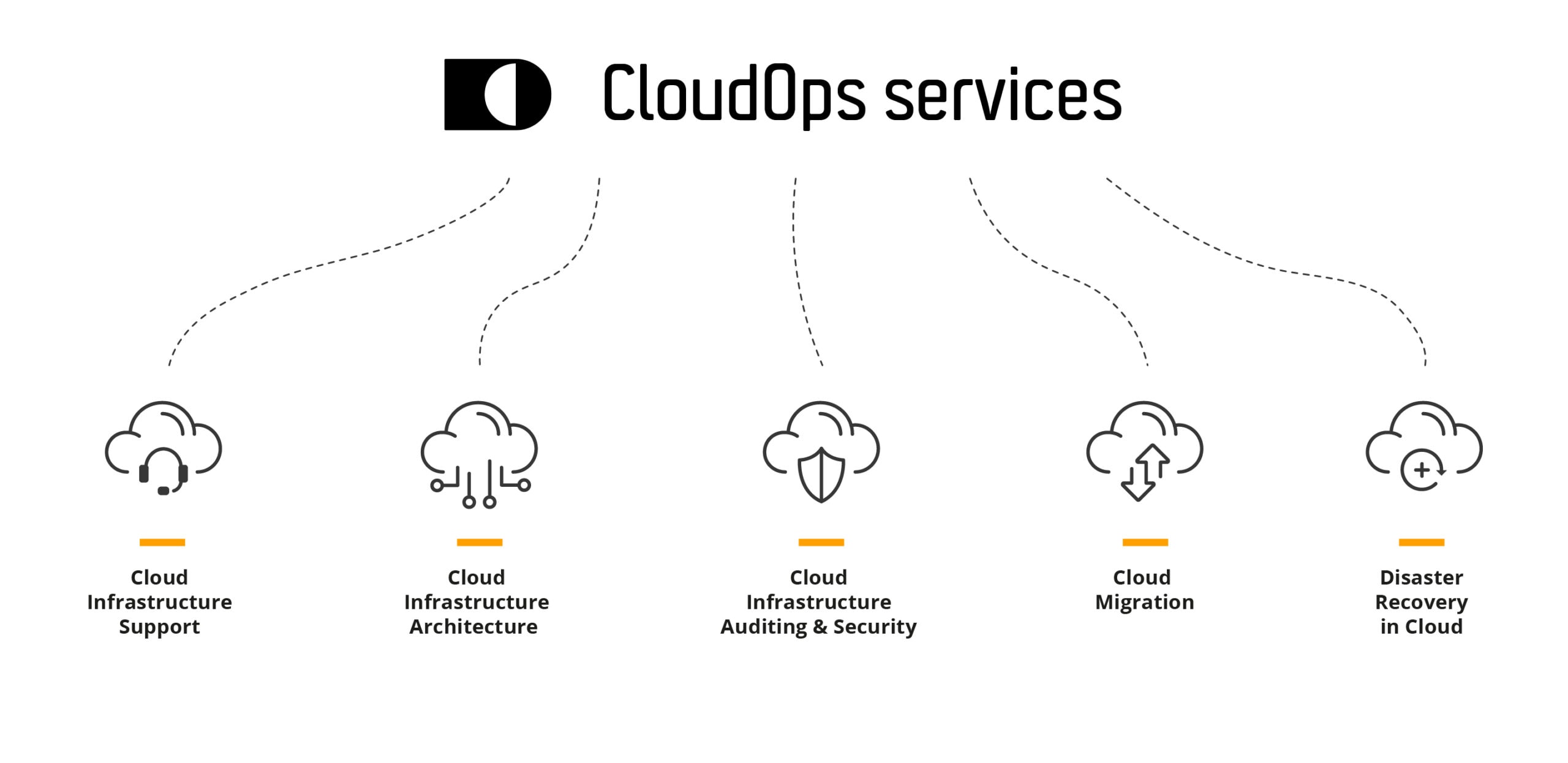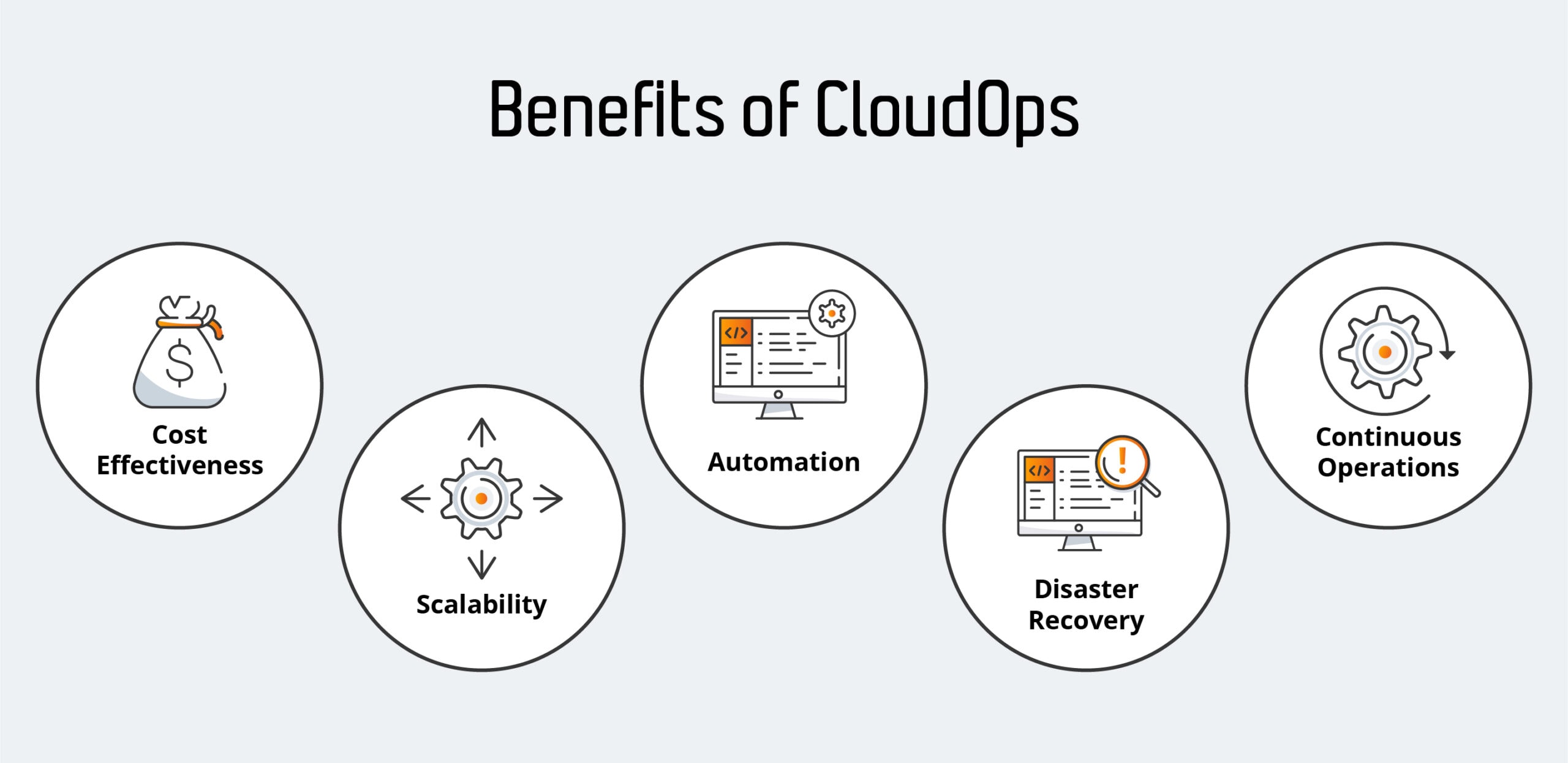
Cloud Operations (CloudOps) solutions for businesses
The recent rise of cloud computing means businesses need to think about effective cloud strategy that supports their operations. This is what we speak about in this guide – we discuss the importance of CloudOps and its meaning for your organisation!
Cloud Operations (CloudOps): definition and concept
Some time ago when someone said “cloud” people would look up to the sky. Today, the word “cloud” has a very different meaning and is used by people around the world in their everyday work.
According to a research by Flexera, in 2020 more than 50% of organisations moved their workload to the cloud infrastructure. Today, being in a cloud is not an option anymore – it’s a must-have for every organisation that is keen to develop.
Despite the massive cloud migration which happened within the last two years, statistics show that 39% of businesses don’t have skills necessary for cloud migration, let alone for managing the cloud services, even if it became the centre of their online operations. This is exactly where CloudOps comes to the fore!
CloudOps, also known as cloud operations, is the process that combines elements of DevOps and IT operations to deliver, run and support your cloud environment with an underlying infrastructure.
As all cloud-based matters, CloudOps is dealt with off-premises, meaning it can be managed by an external team and does not require you to have a specialist on board when you decide to migrate your data and services to the cloud.
Understanding the differences: DevOps Vs. CloudOps Vs. SysOps
When thinking about Cloud in the business, it’s necessary to understand the differences between DevOps, CloudOps and SysOps. Each of these areas has its own set of responsibilities and focuses, necessary to effectively manage modern IT environments.
DevOps, meaning Development and Operations, is a cultural and technical approach to software development and IT operations collaboration. It emphasises breaking down the traditional silos between development and operations teams to streamline and automate the software delivery process.
DevOps practitioners work to automate and optimise the entire software development lifecycle, from code writing and testing to deployment and monitoring. To achieve these goals they use tools and practices like Continuous Integration (CI), Continuous Deployment (CD), Infrastructure as Code (IaC), and containerisation. Their main aims are faster software delivery, improved collaboration, increased efficiency and reduced manual interventions in the deployment process.
As explained earlier, CloudOps, meaning Cloud Operations, is concerned with the management and optimisation of cloud infrastructure and services. It encompasses tasks related to provisioning, scaling, monitoring, and maintaining resources in a cloud environment. CloudOps professionals are responsible for setting up and configuring cloud resources, ensuring high availability, optimising cloud costs, and monitoring performance.
They often work with cloud service providers like AWS, Azure, or Google Cloud Platform.
SysOps, meaning System Operations, is a traditional IT operations role that focuses on managing on-premises or hosted infrastructure. It involves tasks related to server provisioning, maintenance, security, and performance monitoring. SysOps professionals manage physical or virtual servers, networks, storage, and data centres. They ensure system availability, security, and performance.
Their role often involves tasks like patch management, backup, disaster recovery planning, and troubleshooting. Their key goal is to ensure the stability, security, and reliability of on-premises or hosted infrastructure.
The importance of CloudOps in a modern business environment
There are several important reasons for why CloudOps is such a massively important aspect of every modern business environment. As businesses increasingly adopt cloud computing to host applications, store data, and manage infrastructure. Effective CloudOps practices become essential for maximising the benefits of the cloud and ensuring the success and competitiveness of the organisation.
The main benefits it gives include cost optimisation, better scalability and elasticity, high availability and reliability, security and compliance with industry regulations and standards, better performance, deployment and monitoring.
All of these aspects give businesses using CloudOps a great competitive advantage, making them ready to quickly respond to market changes, to innovate and to provide better products or services.
CloudOps Services: areas that Future Processing covers
At Future Processing, we take care of a wide range of services linked to your cloud environment.
Let’s look at our services in more detail.
1. CLOUD INFRASTRUCTURE SUPPORT
When you are already in cloud, there are many aspects of its infrastructure you need to take care off. Future Processing offers you the improvement and advanced optimisation of your existing cloud infrastructure, meaning your services will be secure and always available. What’s more, their maintenance won’t cost you as much as hiring an in-house cloud expert.
2. CLOUD INFRASTRUCTURE ARCHITECTURE
If you are keen to optimise your cloud infrastructure architecture or to design a completely new one, this is a service tailored for you! A well thought-through infrastructure is much more efficient and safer than a random one.
It also allows you to save money, gives you better availability of services and allows for better scalability, meaning your business will not be limited by technology when it gets bigger.
3. CLOUD SERVICES AUDITING & SECURITY
If you have an existing cloud infrastructure and want to make sure it respects all standards and has the best security possible, you should inspect it and get a full report about its faults. That way you will be able to address major problems and challenges before anything bad happens.
4. CLOUD MIGRATION
If you are still using your local infrastructure and are keen to move it to the cloud (which is what we strongly advise you to do), but are not willing to hire completely new people who would be responsible for your digital transformation strategy – Future Processing can do it for you!
Our experts are highly experienced and will get the job done to the best results!
5. DISASTER RECOVERY IN CLOUD
When all your infrastructure is already in cloud, you need to think about its safety and also about what to do in case of a disaster. Only such a preparation will ensure the continuity of your business in case of a failure and will always ensure better security of your systems.
Benefits of implementing CloudOps in Your organization
Performed well, CloudOps allows you to minimise the risk of incidents, increase efficiency, flexibility, and accessibility of your system, making sure all processes and resources are managed correctly and always run flawlessly. It also makes you ready for scalability, should your business become bigger.
What are best practices for CloudOps?
if you are keen to ensure the efficient, secure and reliable operation of cloud environments, take into consideration those best practices for CloudOps:
A good migration strategy, established depending on the requirements of every organisation.
Team work, meaning all the team and everyone concerned is involved in the migration project.
Strong security that involves network security, identity and access management, encryption, Cloud penetration testing and vulnerability management.
Automation of routine tasks and processes to reduce manual intervention and minimise the risk of human error.
Training for all team members to ensure they all have skills necessary for the migration project.
Continuous improvement of CloudOps processes based on performance metrics and feedback.
Future Processing: the best CloudOps experts for You and Your business!
Having a secure, effective, and efficient cloud infrastructure is indispensable. But ensuring it ticks all those boxes may be tricky. Hiring completely new people and hoping their skills and experience will be sufficient to cope with your demands may be just undoable, especially when you take into consideration the global lack of IT talent. Not to mention costs – creating a new vacancy and hiring and training a new person is not exactly cost-effective and may simply not be worthwhile!
This is why the best solution is to entrust your cloud infrastructure to someone who has the right experience and expertise, is trusted, and has done it many times before. That way, your cloud services will give you exactly what you need, without giving any headache!






